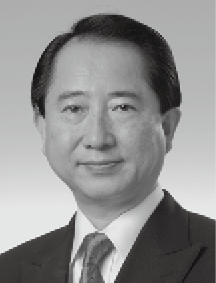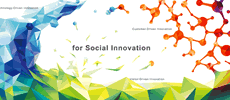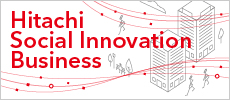Special ContributionBeing a Company that Seeks to Deliver Human Security and WellbeingEthics Point the Way Forward
Ethics at the Birthplace of Economics
Adam Smith (1723–1790), recognized as the father of modern economics, is well known for proposing that markets will tend to a desirable state of equilibrium through free competition, despite the absence of strict controls. As other economists have pointed out, the term “invisible hand” coined by Smith appears only once in his book, An Inquiry into the Nature and Causes of the Wealth of Nations (1776), in a discussion of moderated economic control and regulation.
The term first appears in The Theory of Moral Sentiments (1759), another book written by Smith that serves as a precursor to An Inquiry into the Nature and Causes of the Wealth of Nations (The Wealth of Nations). Part 1, Chapter 1 of The Theory of Moral Sentiments is entitled “Of Sympathy.” The system of ethics established in these two books remains just as pertinent when viewed in the light of the latest neuroscience. While Smith is usually thought of as an economist, he was originally an ethicist, someone who saw morality (ethics) as being the basis of economics.
AI as an Underpinning of Human Security and Wellbeing
In broad terms, artificial intelligence (AI) is an attempt to find artificial substitutes for certain brain functions. The foundation of digital information processing lies in the classical Chinese bit notation used in the hexagrams of the I Ching, formalized by Leibniz as the binary system. Bits are also fundamental to biological information processing, where they arise from the threshold-based on/off nature of neural connections. While these neural bits are the basic units of human information processing when viewed at the microscopic scale, this processing becomes analog when considered in macro terms. The notion of a bit is going through a process of evolution, from classical atomic theory to quantum physics, and from there to the idea of qubits based on wave-like behavior.
Meanwhile, the ancient idea of printing forms part of the broad underpinning of modern information processing technology, giving rise to modern semiconductor fabrication techniques and enabling high circuit integration density and high-speed processing. Now, AI has arisen as an alternative to certain of the higher brain functions of modern humans (Homo sapiens). The full potential of this alternative remains unknown, but its scope will be large. This is where the essence of AI ethics lies. With it comes a need for a new ethical system, one that bridges the natural sciences and the humanities and social sciences, bringing these together.
Thin Biosphere and Existential Environmental Problems
In the pursuit of human security and wellbeing, it is not enough to think solely in terms of the humanities and social sciences, requiring also that the impediments to achieving a practical ethics (the underlying constraints that cannot be avoided) be addressed in terms of the natural sciences. The Earth was born 4.8 billion years ago as a celestial body in the solar system. Life emerged 3.8 billion years ago. The primordial atmosphere gained its oxygen as a result of photosynthesis by the proliferation of cyanobacteria growing in the shallow oceans. The Earth’s biosphere is now made up of oceans and an atmosphere that is 20% oxygen. Half of the atmosphere (by mass) lies within 6 km of the ground, and the region above 100 km in altitude is defined as outer space. In other words, the region occupied by human beings can be likened to a soap bubble, a thin surface layer on a planet with a radius of 6,400 km.
Modern humans account for the largest mass of any species in the biosphere, and the impact of human artifacts on this thin region is incontrovertible. Representative examples can be found in the global warming caused by greenhouse gases (by-products of those human artifacts), and in pandemics caused by the spread of viruses through cities(1).
Universal Ethics
While ethics, as dealt with by the humanities, has evolved from customs into legal systems and then into ethics and morality, a new ethical system that also encompasses the natural sciences is needed if we are to adopt an all-inclusive approach to future society. Neuroscience recognizes emotional feelings as a high-level capacity that is unique to human beings, distinct from what is observed in most other animals. While sympathy (in the sense of empathy, as it was used by Smith) is a form of emotion, it has become clear from recent research in evolutionary science and cognitive neuroscience that it is distinctive of humans, ranking at the top of the hierarchy of emotions. Scientific proof is being found for the proposition that emotions such as sympathy were selectively favored by evolution, a consequence of how it was only after we had invented society that physically weak human beings were able to overcome other hardier animal species. This is the scientific basis for the ideas of “Tomo-iki” (the coexistence between self and others) and altruism(2), (3).
Early Days of Hitachi Group Provide Basis of New Corporate Ethics
Hitachi, Ltd. was founded in 1910 at the Hitachi Mine with company founder Namihei Odaira having come to the mine out of his commitment to Fusanosuke Kuhara, the head of the mine company. What he found at the mine was a consistent corporate ethics, one that existed in the gap between producing the large amounts of copper needed by Japan at the time and the unavoidable pollution that came with it. After considerable effort, Hitachi Mine not only succeeded in constructing the world’s tallest chimney (155.75 m) in 1915, it also established the first-ever aerological observatory nearby to achieve an optimal balance between production and the smoke it emits. It was an example of science and technology being used to resolve a societal problem, underpinned by corporate ethics. This spirit has been handed on unbroken to the present day and is receiving fresh attention for how it embodies a new corporate philosophy underpinned by ethics, that of the “ethical company”(4), (5).
REFERENCES
- 1)
- H. Koizumi, “Engineering for Human Security and Well-Being,” Engineering, 1 (3), pp. 282–287 (Sep. 2015).
- 2)
- H. Koizumi, “Ethics-Based-Engineering: Importance of Academy’s Initiative Toward Human Security and Well-Being,” Healthcare Engineering (edited by R. Shorey and P. Ghosh), Springer, Singapore, pp. 1–7 (2017).
- 3)
- H. Koizumi, “Scientific Learning and Education for Human Security and Well-Being,” Children and Sustainable Development: Ecological Education in a Globalized World (edited by A. M. Battro, P. Léna, M. S. Sorondo, and J. Braun), Springer, pp. 239–257 (2017).
- 4)
- H. Koizumi, “Capitalism from the Perspective of Brain-Science,” Where Will Capitalism Go? (edited by T. Horiuchi and H. Koizumi), Nippon Hyoron Sha Co., Ltd., Tokyo, pp. 162–203 (Jul. 2019) in Japanese.
- 5)
- Nature, “Listening to Locals Is Key to Building Society 5.0”





